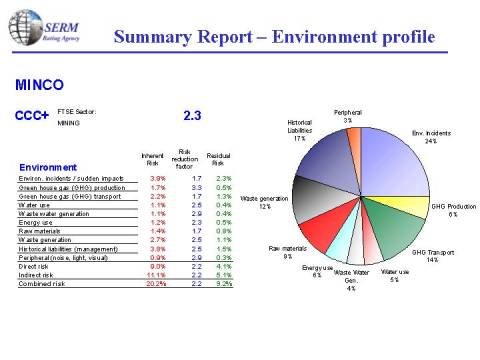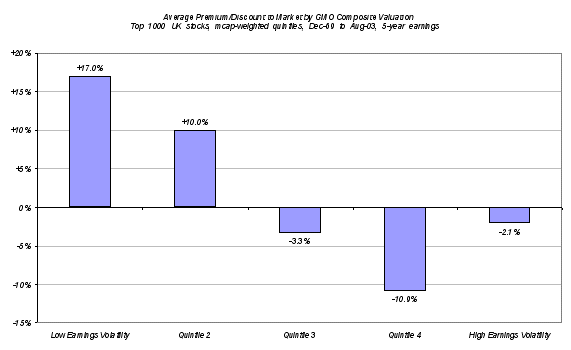Ethical Volatility: How CSR Ratings & Returns Might Be Changing The World Of Risk
By
Professor Michael Mainelli
Published by Balance Sheet, The Michael Mainelli Column, Volume 12, Number 1, Emerald Group Publishing Limited, pages 42-45.
Shouldn't ethics pay?
It is difficult to imagine a more absurd oxymoron than "riskless capitalism", however societal values are changing. Increasing expectations of better "governance" have led to a deluge of ethical initiatives on countless topics. Robertson [2002] points to both the enormous number of Corporate Social Responsibility (CSR) issues and the lack of appropriate management response. Henderson [2001] argues forcefully that the burden of CSR on organisations is harming organisations and society. While the increasing burden of CSR may be a sign of an affluent society moving towards a risk society, i.e., one which has moved from relations based on production to relations based on risk [Beck, 1992], nevertheless organisations also have a job to do.
The above may seem like a whinge about social responsibility and the inevitable laws, regulations and procedures that seem to result. Far from it. The big societal problem is how can organizations be rewarded appropriately for CSR initiatives. Without reward, organizations will not change their behaviour. There are a number of ways in which organizations might be rewarded for CSR initiatives, both carrots for success and freedom from sticks. Freedom from 'sticks' includes not being subject to NGO attacks, not having government impositions, not being boycotted from regions or markets, or not losing key employees with different ethical values. 'Carrots' might include good public relations, brand enhancement, access to contracts with CSR requirements, positive relations with NGOs or attracting higher-quality staff at lower rates. One big carrot might be access to cheaper capital. According to some estimates, socially responsible investment funds have grown in five years from £200 million to over £10 billion and continue to grow rapidly.
The ideal reward for CSR in commercial organisations would be a demonstrable increase in shareholder value. If there were a proven increase in value, then CSR decisions would fit better into existing financial decision-making models and would be subject to return-on-investment approaches. Paradoxically, if CSR cannot fit at least somewhat into financial models, then society runs the risk of poor investment decisions leading to under or over investment in CSR with the consequent waste of public resources that under or over investment implies.
Devil in the ethical details
One fundamental problem in proving shareholder return is measuring CSR in the first place. The market is responding as a number of organisations are experimenting with a variety of approaches. In essence, the gist of the solution is to rate organisational adherence to CSR initiatives, a comparative rating system. Related problems include:
- defining CSR. There are a plethora of CSR issues - "canopy grown coffee beans", "dolphin-friendly tuna", "child-free labour", "non-discrimination", "free trade", "Sarbanes-Oxley", etc. Just about any public risk - environmental, ethical, governance, health or safety issue - can be a valid CSR issue. Yet people can disagree about whether something is CSR at all, for instance nuclear power, pornography, gambling or selling to children;
- conflicting CSR responses to issues. For instance, some conservationists permit 'sustainable' use of natural resources while others insist on protected areas or 'no-go' zones. The definition of child labour can vary, i.e. up to what age is a person a child? If children don't have jobs, where will the family get income? Is there an appropriate alternative activity for the children, e.g. access to education?
- appropriate CSR. Something as apparently simple as "canopy-grown/shade-grown coffee beans" or "fair trade" coffee would appear to affect importers, processors, distributors and retailers of coffee. Probably also organisations that use coffee in chocolates or cakes. What about organisations that do business in coffee growing countries? But what about the coffee machines in every organisation up and down the country?
Nevertheless, a number of organizations are working at solving these CSR measurement and comparison problems, for instance Business in the Environment (BiE), The Ethical Investment Research Service (EIRIS), Innovest, Sustainable Asset Management, Core Ratings, FTSE4Good, SERM or Trucost [a good overview of many of these in CSR Europe, 2002]. Each of these organizations tackles measurement in different ways, but they can broadly be categorised as either individual or index, and inclusive or exclusive. Some organizations provide individual corporate ratings; others provide an overall index comparing one "ethical" group against a norm. Inclusive approaches attempt to rate everyone, e.g. SERM; exclusive approaches leave out certain categories, say tobacco or defence, e.g. FTSE4Good.
Measuring the immeasurable benefits of CSR
Attempts to measure CSR benefits are numerous. For instance, for the U.S. and foreign businesses rated by GovernanceMetrics International, companies with the worst governance ratings returned 5.4% for the 12 months to August 2003, compared with 11% for all stocks rated. The Dow Jones Industrial Average gained 9.7% in over the same 12 months. On the other hand, UK ethical investment vehicles may, as a class, have under-performed, or over-performed, traditional investment vehicles depending on whom you believe, which index, which comparator and which time period.
One detailed comparative study concluded that SERM's CSR ratings predicted market outperformance. SERM includes a 39 rating areas of ethical, environmental, governance, safety and health issues in an overall rating. SERM ratings are inclusive, i.e. no sector is excluded. SERM distinguishes between an inherent risk factor, showing where the company would be rated on direct and indirect risk, and a risk reduction factor, showing how successful management has been at managing down its risk. The difference between inherent risk and the risk reduction factor is clearly the residual risk. SERM also provides a number of comparative ratings by sector so, for instance, a tobacco company can have a terrible inherent risk factor but a very good risk reduction factor compared with other tobacco companies, typically through its management of non-tobacco CSR issues.
A typical rating looks like the following mining company:

Kim T Christensen and Brian Khyl of Copenhagen Business School's Department of Finance examined three indices in 2002, SERM, FTSE4Good and the Dow Jones Sustainability Indexes (sic). There are a number of methodological difficulties with comparisons of this type which they were exploring (different compositions of rated companies, US versus European biases, sector biases, time periods, etc.). They managed to construct a valid peergroup for comparison. In absolute performance, high SERM rated companies outperformed the peergroup by 9.2%; DJSI rated companies by 5.5% and FTSE4Good underperformed. So, over certain time periods some CSR indices may outperform the market. While this investment opportunity might disappear over time, it is interesting to ask why it exists in the first place. Are investors seeking out CSR companies or are CSR companies a better investment?
Sustainable = stable?
One intriguing thought has been to assume that companies that adhere to CSR should reduce earnings volatility. In many ways, CSR should make a company more "sustainable". The company should be less vulnerable to actions against it (e.g. attacks from NGOs or government inquiries or bad PR or shareholder dissent), have fewer staff qualms and problems or be able to work in longer term, more stable partnerships. Reduced earnings volatility should increase value. This is in many ways comparable to some work Z/Yen did on "sustainable" marine resource benefit measurement [The Economist, "A Novel Use for Options Theory - Fishy Maths", 16 August 2001]. Basically, something that is sustainable should have fewer fluctuations and the consequent reduction in volatility can be valued.
Applying the "sustainable" concept to CSR itself, companies that adhere to CSR should have lower earnings volatility and this should feed through to higher share prices. In overly-simplistic terms, the value in the volatility should move from option holders to shareholders. It is more than theory as the following graph shows that lower volatility does provide a premium since at least 1969.

However, as yet, absolute share price volatility has not been linked to CSR ratings. Analysis of the SERM ratings has yet to show a significant correlation between volatility of share prices over a variety of periods and either the SERM rating itself or the residual risk factor. This analysis included intra-sector correlations of volatility with SERM ratings. Further research on the links between CSR and volatility may yet produce some results over longer time periods or with other performance measures such as profit or price/earnings ratios.
CSR initiatives are here to stay. CSR initiatives cost companies money, but should be producing better returns, attracting investment or reducing the volatility of certain key performance measures. If, over time, CSR cannot be shown to improve financial performance or valuation of the companies that sign up, people may need to re-think how they should really measure corporate contributions to society. In the meantime, studying the link between CSR and financial performance should be a fruitful area for investment research.
The author would particularly like to thank Anthony Hene of GMO and Jonathan Barber of SERM for sharing their data with him without in any way tainting their reputations with his opinions.
- Beck, Ulrich, Risk Society: Towards A New Modernity, (Mark Ritter, translator) Sage Publications, 1992.
- CSR Europe, A Guide to Sustainability Analysis Organisations, 2002.
- Henderson, David, Misguided Virtue: False Notions of Corporate Social Responsibility, Hobart paper 142, Institute of Economic Affairs, London, 2001.
- Robertson, Stephanie, Dilemmas in Competitiveness, Community and Citizenship, The London School of Economics and Political Science, August 2002.
Michael Mainelli, FCCA, originally did aerospace and computing research before stooping to finance. Michael was a partner in a large international accountancy practice for seven years before a spell as Corporate Development Director of Europe's largest R&D organisation, the UK's Defence Evaluation and Research Agency, and becoming a director of Z/Yen (Michael_Mainelli@zyen.com).
Michael's humorous risk/reward management novel, "Clean Business Cuisine: Now and Z/Yen", written with Ian Harris, was published in 2000; it was a Sunday Times Book of the Week; Accountancy Age described it as "surprisingly funny considering it is written by a couple of accountants".
Z/Yen Limited is a risk/reward management firm helping organisations make better choices. Z/Yen undertakes strategy, finance, systems, marketing and intelligence projects in a wide variety of fields, such as developing a risk/reward prediction engine, helping a global charity win a good governance award or benchmarking transaction costs across global investment banks.
[An edited version of this article originally appeared in "Ethical Volatility: How CSR Ratings and Returns Might be Changing the World of Risk", Balance Sheet, The Michael Mainelli Column, Volume 12, Number 1, (January 2004) pages 42-45.]